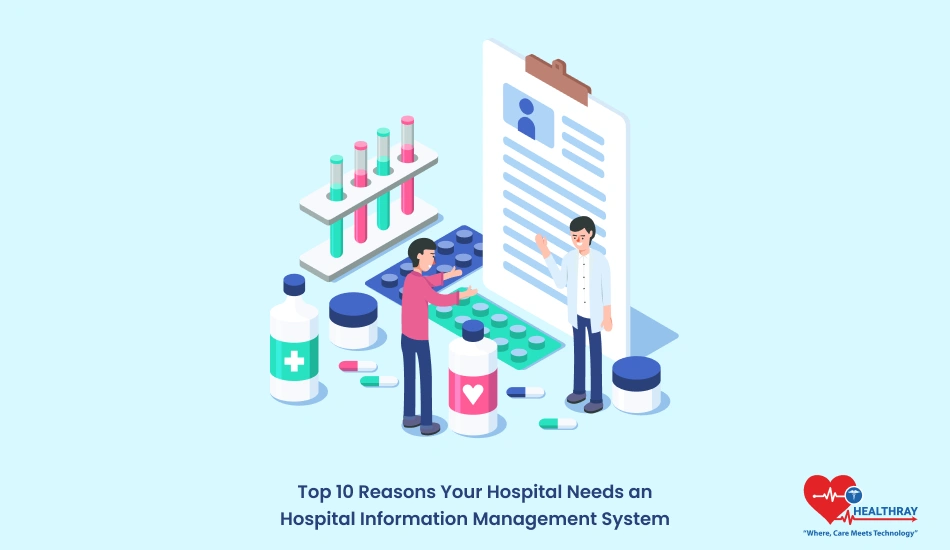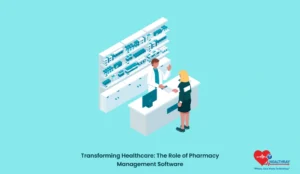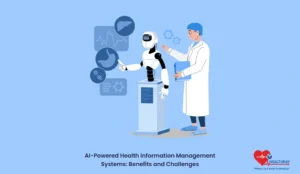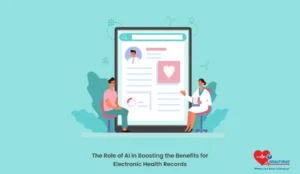In today’s fast-paced healthcare environment, hospitals face more data, patients, and administrative challenges than ever. At the heart of every hospital’s success lies effective information management—getting the right data to the right people at the right time. An Information Management System (IMS) isn’t just a “nice-to-have”; it’s becoming essential for hospitals aiming to improve patient care, streamline operations, and make informed decisions that support both patients and staff.
This article dives into the top 10 reasons why adopting an IMS could be a game-changer for your hospital. You’ll discover how an IMS can enhance patient safety, boost operational efficiency, and ultimately contribute to better healthcare outcomes. By the end, you’ll see that an IMS isn’t just a tool for managing data—it’s a strategic investment in the hospital’s future.
Top Reasons Your Hospital Needs an HIMS
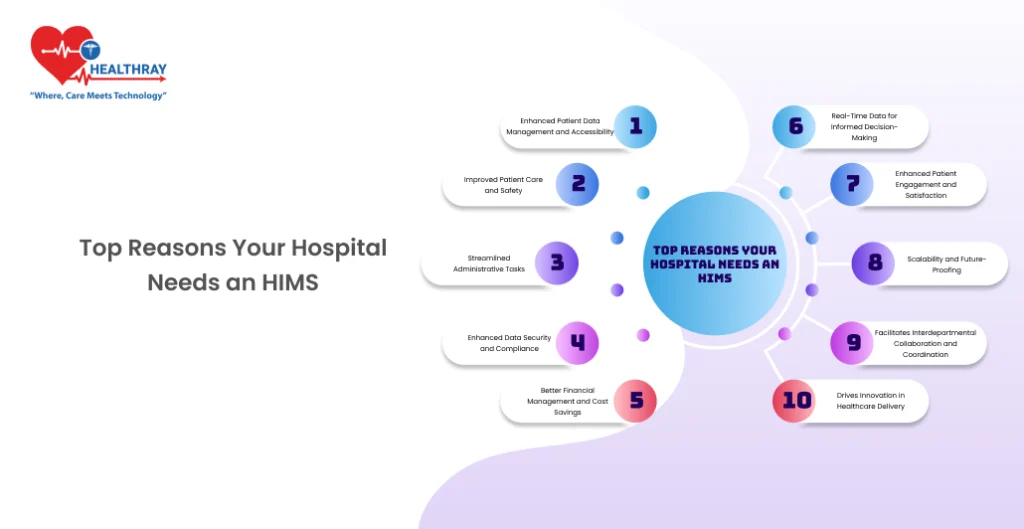
Enhanced Patient Data Management and Accessibility
In a hospital setting, quick and accurate access to patient records is critical. An Hospital Information Management System centralizes patient data, providing authorized staff with seamless access across departments. Whether it’s a nurse needing medical history in the ER or a specialist consulting recent lab results, an IMS ensures that every piece of relevant information is just a few clicks away.
Centralized data access doesn’t just save time—it also reduces the chances of errors due to incomplete or outdated information. Staff no longer need to shuffle through paper records or wait on inter-departmental updates, which means faster, more coordinated care for patients. Having patient data accessible in one system can lead to significant improvements in patient outcomes and boosts overall operational efficiency.
Improved Patient Care and Safety
When doctors and nurses have quick, accurate access to patient information, they’re empowered to make safer, more informed decisions. An IMS plays a crucial role in reducing medical errors by providing real-time, comprehensive data at every step of patient care. For example, an IMS alerts healthcare providers to potential medication conflicts, allergies, or prior adverse reactions, helping prevent avoidable medical errors.
This kind of system also supports continuity of care. Each department has up-to-date patient information, so hand-offs between shifts or departments are smoother and less prone to oversight. Patients benefit from cohesive care, and healthcare providers can focus more on treatment rather than sorting through fragmented records. In the long run, better data management translates directly into fewer complications, faster recovery times, and overall improved patient safety and satisfaction.
Streamlined Administrative Tasks
Running a hospital involves a massive amount of paperwork and administrative processes, from patient scheduling and billing to reporting and compliance checks. An Hospital Information Management System automates many of these routine tasks, freeing up administrative staff to focus on high-priority responsibilities rather than repetitive data entry or paperwork.
By automating processes like appointment scheduling, patient check-in, and insurance billing, an IMS helps reduce wait times and minimizes scheduling errors. Administrative tasks that used to take hours can now be handled in minutes, cutting down on human errors and boosting efficiency. For hospital administrators, this streamlining also translates into significant cost savings as staff can be better utilized, ultimately allowing the hospital to deliver better service without added operational burden.
Enhanced Data Security and Compliance
Protecting patient data is one of the most significant responsibilities hospitals face, and an Hospital Information Management System offers robust tools to keep this information safe. An IMS helps hospitals meet regulatory standards like HIPAA by using advanced encryption, secure access controls, and audit trails to monitor who accesses patient data and when.
Data breaches can be devastating, both financially and reputationally. By centralizing data within a secure system, hospitals can reduce the risk of unauthorized access and ensure compliance with healthcare regulations. An IMS allows administrators to set strict access permissions, ensuring that only authorized personnel can view sensitive information. In addition, many IMS platforms offer regular software updates to address security vulnerabilities, keeping the system resilient against evolving cyber threats.
Better Financial Management and Cost Savings
Managing a hospital’s finances is no small task, and even minor billing errors or inefficiencies can lead to significant revenue loss over time. An Hospital Information Management System supports accurate and automated billing processes, reducing the likelihood of errors and ensuring that hospitals capture revenue accurately for every service provided. IMS systems can track financial data in real time, giving administrators a clear picture of expenses, revenue, and cash flow at any moment.
With streamlined billing and efficient payment tracking, Hospital Management Software reduces administrative burdens and helps hospitals avoid costly mistakes. The system also identifies areas where the hospital might be overspending or underbilling, allowing financial officers to make adjustments that lead to long-term savings. Ultimately, the IMS contributes to a healthier bottom line by cutting unnecessary expenses and improving revenue cycles.
Real-Time Data for Informed Decision-Making
In a hospital environment, timely and accurate data can make all the difference in how resources are allocated and how quickly patients receive care. An Hospital Information Management System provides real-time insights into various aspects of hospital operations, including patient flow, staff performance, equipment availability, and bed occupancy rates. With access to up-to-the-minute data, administrators and healthcare providers can make data-driven decisions that enhance efficiency and patient care.
For example, during periods of high patient intake, real-time data helps administrators quickly adjust staffing or reallocate resources to areas with the highest demand. This level of responsiveness allows hospitals to operate more smoothly, improving patient outcomes and staff productivity. With IMS-driven data, decision-makers gain valuable insights that support short-term responsiveness and long-term strategic planning.
Enhanced Patient Engagement and Satisfaction
Today’s patients expect more transparency and control over their healthcare experience, and an Hospital Information Management System helps meet those expectations. An IMS allows patients easier access to their own health information, appointment scheduling, and billing through secure patient portals. Patients can check lab results, communicate with their healthcare providers, and manage follow-up care, all in one place.
This level of access empowers patients, making them feel more engaged in their healthcare journey. It also reduces the workload for administrative staff, as patients can handle basic inquiries themselves through the portal. In the end, patient satisfaction increases when they feel involved and informed, leading to better retention rates and a stronger reputation for the hospital.
Scalability and Future-Proofing
As hospitals grow, so do their data needs. An Hospital Information Management System is built to scale, meaning it can adapt to an expanding number of patients, services, and even new locations without losing efficiency or compromising performance. Whether a hospital is adding a new wing, integrating telemedicine services, or planning for population growth, a scalable IMS ensures that data management can keep up with these changes seamlessly.
Beyond just scaling in size, an IMS can also adapt to advancements in healthcare technology. Many IMS platforms are compatible with future upgrades, such as AI-powered diagnostics, predictive analytics, or remote monitoring tools. This flexibility makes it a valuable long-term investment, saving hospitals from needing a complete overhaul as they adopt new technologies down the line. With an IMS in place, hospitals can confidently plan for the future, knowing their data management system will grow and evolve alongside them.
Facilitates Interdepartmental Collaboration and Coordination
Hospitals rely on multiple departments working together seamlessly to provide the best patient care. An Hospital Information Management System enhances collaboration by enabling departments to share patient information instantly and accurately. When patient data is unified and accessible, transitions between departments—such as from ER to ICU—are smoother and more efficient.
With an IMS, each department has access to up-to-date patient records, eliminating the need for redundant data entry or manual data transfers that can lead to mistakes. This level of coordination ensures that healthcare providers have the full picture of a patient’s history, current condition, and treatment plan, which can be especially critical during time-sensitive situations. The result is faster care, better outcomes, and an overall boost in hospital efficiency.
Drives Innovation in Healthcare Delivery
An Hospital Information Management System can be a powerful tool in helping hospitals embrace modern healthcare solutions. From integrating telehealth services to utilizing AI-driven diagnostics, an IMS provides a strong foundation for adopting cutting-edge technologies. With a centralized, data-driven approach, hospitals can implement innovations that enhance care and expand patient reach.
For instance, IMS platforms that support data analytics can help hospitals identify trends in patient outcomes, enabling proactive adjustments in care protocols. Telemedicine and remote monitoring tools also integrate smoothly with IMS, allowing hospitals to offer virtual consultations and track patient health remotely. By leveraging an IMS, hospitals position themselves as leaders in modern healthcare, attracting both patients seeking advanced care options and talented professionals who want to work in a forward-thinking environment.
Conclusion
An Hospital Management System is more than a technical solution—it’s a strategic asset for hospitals looking to enhance patient care, improve operational efficiency, and stay competitive. From centralizing patient data and boosting data security to enabling real-time decision-making and fostering innovation, an IMS addresses the core needs of modern healthcare facilities.
As hospitals face the ongoing challenges of managing growing patient volumes, maintaining high standards of care, and adopting new technologies, an IMS provides the foundation for a more streamlined, secure, and responsive healthcare environment. For any hospital administrator or decision-maker, investing in an IMS means setting up the hospital for long-term success, improved patient satisfaction, and financial stability.
